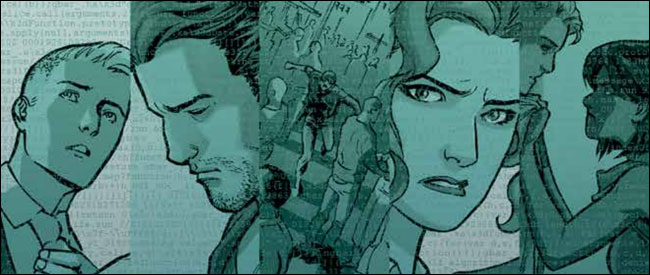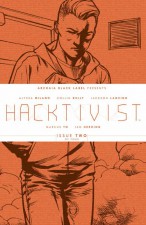It’s got its glitches, but Hacktivist, published by Archaia, is a relevant and well-executed mini-series that’s well worth a look.
At some time, even those of us whose IT skills are limited to half a dozen keyboard shortcuts have winced at the fictional depiction of hacking and other computer-related shenanigans, even in a medium with the visual potential of comics.
Fortunately, Archaia’s Hacktivist – a four-part mini-series created by actress/producer Alyssa Milano, written by Jackson Lanzing and Collin Kelly and illustrated and coloured by Marcus To and Ian Herring – keeps the technobabble to a minimum and takes a character-led approach to the world of online activism that pays dividends.
Its leads are your typical mismatched pair of ultra-rich young white men from the Bay Area: Ed Hiccox and Nate Graft, the billionaire founders of YourLife, the world’s most prevalent social network. While Ed is the eccentric, obsessive genius behind the network, Nate is the flamboyant, impulsive rock-star entrepreneur.
However, when they clock off at the end of the day, we see what they’re really all about: far from the business pages, they’re also .sve_urs3lf – “the most dangerous black-hat hacker collective on the damn planet”, ‘pparently.
While it’s YourLife that keeps the lights on and the private jet in the air, the architecture of the social network they’ve created has another purpose. As Ed puts it in #1, “We could change the world. Fix the broken things. Break what needs breaking.” Their current project? Enabling activists to oppose Tunisia’s dictatorial government.
The end of the first issue threw a bit of a spanner into the works, with Nate having the squeeze put on him by Agent Foxy McFox of the CIA Special Computer Police (or something). Having rumbled Ed and Nate’s cover, she “requests” their help in overthrowing the Tunisian regime. The issue ended with Nate having to consider if your enemy’s enemy could ever really be your friend.
However, the start of #2 seems to take a step backwards, as Ed and Nate apparently forget that they’re the smartest men in the room. Even allowing for Nate’s rapacious ambition, it seems a bit unlikely that he’d overlook the disastrous reputational risk to YourLife of getting into bed with the government.
Ed also seems to go belly-up and co-operate very easily, after his initial impassioned outburst against the idea, and the idea that he’d be unaware of the ending and moral of the story of the hare and the tortoise rings a bit of a bum note as well.
Anyway, while Nate remains an eager-to-please puppy, happy to roll over and let the government tickle his tummy, Ed is pursuing his own, more opaque agenda, which picks up nicely on some seemingly throwaway moments from #1 and leads to an explosive climax to the issue.
Of course, this brief synopsis does draw a bit of attention to the sizeable elephant in the room: the sense that Hacktivist is more about the travails of two unimaginably privileged Westerners doing their bit to shoulder the White Man’s Burden than it is about people risking their lives to fight oppression and build a better society.
The real heroes of the story are certainly Sirine and her opposition activists in Tunisia – and without wanting to drop much in the way of spoilers, it’s a relief that by the end of the second issue, the book looks ready to focus more on their high-stakes struggle.

Hacktivist clearly still has some way to go before it gets close to reflecting the role played by social networking in the ‘real’ Arab Spring (and other popular uprisings around the world). However, as the series hits its midway point, there’s a shift in the character dynamics and the environment in which they’re acting out their struggle. ‘Shit gets real’, as the young folk say.
And at least focusing the book on a situation in Tunisia rather than Burkmizistan or Zimboslavia gives it a bit of verisimilitude and might encourage a few readers to find out more about the Arab Spring and its aftermath.
As in #1, the excellent artwork of Marcus To and colouring of Ian Herring aim for clarity rather than innovation, and succeed admirably. However, given its subject matter, it might have been nice if the whole creative team was a little bolder in its treatment of online material and the social media environment, in the way Mike Carey and Peter Gross did in the early days of The Unwritten, when the question of Tom Taylor’s true identity was breaking the Internet.
If Hacktivist was an ongoing title, I’m not sure if my level of commitment to it would stretch indefinitely. However, with the urgency that goes with being a four-issue mini, I’m looking forward to seeing how it plays out.
Alyssa Milano (Creator), Jackson Lanzing & Collin Kelly (W), Marcus To (A) • Archaia Black Label, $3.99, February 26, 2014

















